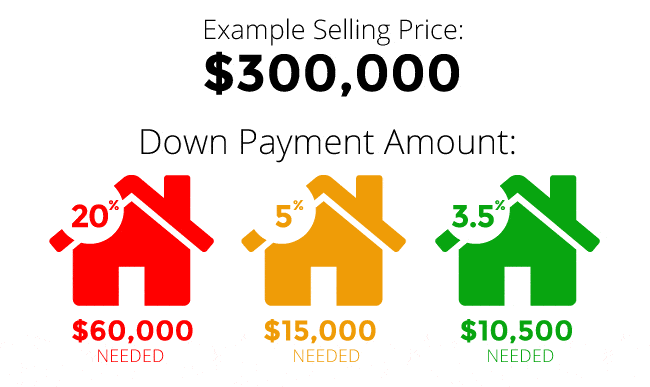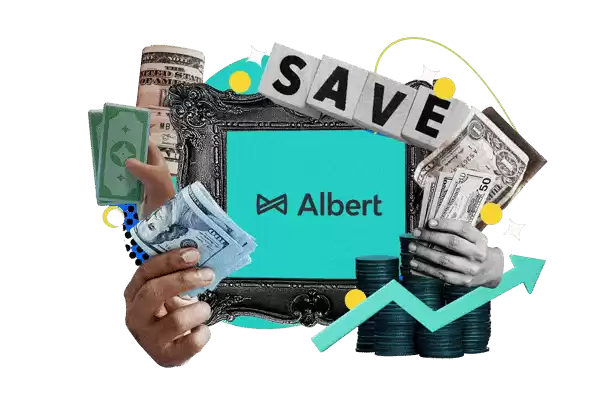In 2023, having a 20% down payment is no longer required to buy a home. With rising inflation and interest rates, it can be difficult for first-time home buyers to come up with the required 20% down payment for rising home prices.
Something had to change and thankfully lenders are now more lenient and offer more options for those who want to buy a home without a down payment in hand. Lenders are offering different types of products and some require no money down or much less than 20%.
Let’s explore your options.
What is a Down Payment?
A down payment is the amount of money that is paid when you are purchasing a home. This number is typically represented as a percentage of the total home value selling price. For example, as represented in the image below, if the home value is $300,000 then a 20% downpayment would be $60,000.

Lenders require down payments because it protects them should you default on the loan, especially if you fail to make payments in the early years of the loan when more is owed on the mortgage loan.
Moreover, to start the process of buying a house, you need to first pay an upfront deposit to the seller or a down payment to the lender for your home loan. Most people cannot fathom buying a house without paying a large down payment which is usually 5-20% of the property value depending on the mortgage product.
How a Lower Down Payment Affects Your Mortgage
While it is possible to purchase a home without a down payment or significantly lower down payment, two things occur:
Your interest rate will increase: Since the lender has more risk with a lower down payment the underwriter will increase the interest rate.
You will have to pay mortgage insurance (PMI): Since the lender is not getting a full down payment amount of 20% they will require you to pay for mortgage insurance. Mortgage insurance lowers the risk to the lender of making a loan to you, so you can qualify for a loan that you might not otherwise be able to.
Ways to Buy a Home with No Down Payment
But now there are certain options available in which you can go about buying a house with no down payment.
1. A Conventional Mortgage with No Down Payment
A conventional mortgage is a type of loan in which the down payment is typically 20%. But this type of loan can also be finalized with no down payment at all.
If you have a good credit score but no cash in hand, you can start buying a house with no down payment. Also, if you have good credit — FHA and Conventional loans need just 3.5% or less down, but 100% of the down payment can be a gift.
The drawback? The deterrent for this type of loan is that you have to pay a higher rate of interest.
Also, you need to keep one of your properties as a guarantee against the payment of the mortgage loan. This is because if you are going with buying a house with no down payment, it poses an extremely high risk on the lender in case you are unable to settle the amount in time.
2. Federal Programs
Another way of buying a house with no down payment is to attend the federal programs. The VA (Department of Veterans Affairs) is a kind of loan that is given to the military service officers who have retired from the service.
With this approval, you can buy a house with no down payment. USDA and VA loans require zero down payment and similar programs are available for those who do not have enough credit or cash to pay for a down payment.
USDA Loans
USDA loans are an excellent option for those seeking increased homeownership in rural areas. They offer subsidized interest rates and do not require a down payment or have minimum credit score requirements.
However, to be eligible for a USDA loan, applicants must prove their creditworthiness by having a credit score of 580 or higher. They must also be legal permanent U.S. residents, maintain dependable income, have a household income that matches 115 percent of the area’s median income or lower, and use the property as their primary residence in a rural area.
These loans can be used to purchase various types of properties, including existing homes, new constructions, manufactured homes, condos, townhouses, and short sale or foreclosed homes. While buyers are usually responsible for closing costs, lender fees, and mortgage insurance, they may have some of these expenses covered by the seller or lender through seller concessions and lender credits.
VA Loans
VA loans offer a viable home-buying solution for U.S. military members, veterans, and their spouses. Similar to USDA loans, VA loans do not require a down payment or credit score minimums. However, most lenders prefer a credit score of at least 580.
To apply for a VA loan, you must have a certificate of eligibility (COE) that certifies your service history and current duty status, proving your eligibility.
To be eligible for VA benefits, you must have served 90 days of active wartime service, 180 days of active peacetime service, six years in the National Guard or Reserves, or be the spouse of a service member who died in the line of duty or following a service-related disability.
The VA guarantees loans against losses with an entitlement, which is similar to private mortgage insurance. This allows lenders to offer zero-down payment purchases with less risk and lower rates.
Additionally, VA loan borrowers are exempt from certain closing costs, such as underwriting and attorney fees.
3. Negotiate with the Seller
Also, if you can win the confidence of the seller by showing him the proof of your steady job and income, you can successfully go about buying a house with no down payment.
If the seller is convinced that you can settle the amount in time without having to pay any down payment, you can surely buy the home without any down payment on hand.
Options For A Low Money Down Mortgage
If you’re looking to buy a home but don’t have a lot of money for a down payment, there are still several mortgage options available that require a low down payment or no down payment at all.
- FHA Loans: FHA loans require a minimum down payment of 3.5% of the purchase price, which can come from a gift from a family member or a grant from a state or local government down payment assistance program.
- VA Loans: Veterans Affairs offers VA loans that require no down payment for eligible service members, veterans, and their spouses.
- USDA Loans: The U.S. Department of Agriculture offers USDA loans for homebuyers in rural areas that require no down payment. However, there are income limits and property eligibility requirements.
- Conventional Loans: Some conventional loans offer low down payment options, such as the HomeReady and Home Possible programs. These programs require as little as 3% down and offer reduced mortgage insurance premiums.
- State and Local Down Payment Assistance Programs: Many states and local governments offer down payment assistance programs that can help you with your down payment or closing costs.
It’s important to note that while these options allow for a low down payment or no down payment, you will likely pay more in interest and fees over the life of the loan. It’s crucial to shop around and compare offers from different lenders to find the best mortgage option for your specific situation.
Related: 9 Ways to Get Money for a Down Payment on a House
Mortgage Options For Bad Credit
Having a bad credit score can limit your options when it comes to securing a mortgage. However, there are still some options available to those with poor credit.
- FHA Loans: The Federal Housing Administration offers FHA loans to help people with less-than-perfect credit obtain a mortgage. FHA loans require a credit score of at least 500, but borrowers with a credit score of 580 or higher can qualify for a down payment as low as 3.5%.
- VA Loans: Veterans Affairs offers VA loans to eligible service members, veterans, and their spouses. VA loans have no minimum credit score requirement, but some lenders may have their own credit score requirements.
- Subprime Mortgages: Subprime mortgages are designed for borrowers with poor credit. These loans come with higher interest rates and fees, but they can be a viable option for those who cannot qualify for other types of mortgages.
- Co-signer: Having a co-signer with good credit can help you secure a mortgage. The co-signer is essentially taking responsibility for the loan if you fail to make payments.
- Improve Credit Score: If you have bad credit, it’s important to work on improving your credit score. Pay your bills on time, keep your credit utilization low, and dispute any errors on your credit report.
It’s important to note that while these options are available, having bad credit can make it more difficult to secure a mortgage, and you may end up paying more in interest and fees. It’s crucial to shop around and compare offers from different lenders to find the best mortgage option for your specific situation.
The Bottom Line
Thus it is necessary that you have a high credit history in your name and are eligible in paying a higher rate of interest.
If you’re looking to meet traditional 20% down payment, there are easy ways to boost your savings. If a mortgage with a low to no down payment is more your style, you still have options!
With these methods, you can consider buying a house with no down payment. In summary, your credit score and monthly income stand as proof that you will not leave the lender empty-handed in the end.
- Get spotted up to $250 without fees
- Join 10+ million people using the finance super app
- Banking with instant discounts on gas, food delivery, groceries and more
- Start investing, saving, and budgeting for free









